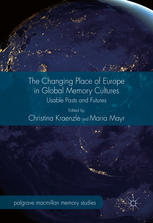

Most ebook files are in PDF format, so you can easily read them using various software such as Foxit Reader or directly on the Google Chrome browser.
Some ebook files are released by publishers in other formats such as .awz, .mobi, .epub, .fb2, etc. You may need to install specific software to read these formats on mobile/PC, such as Calibre.
Please read the tutorial at this link: https://ebookbell.com/faq
We offer FREE conversion to the popular formats you request; however, this may take some time. Therefore, right after payment, please email us, and we will try to provide the service as quickly as possible.
For some exceptional file formats or broken links (if any), please refrain from opening any disputes. Instead, email us first, and we will try to assist within a maximum of 6 hours.
EbookBell Team

4.7
26 reviewsThis book investigates the transnational dimensions of European cultural memory and how it contributes to the construction of new non-, supra, and post-national, but also national, memory narratives. The volume considers how these narratives circulate not only within Europe, but also through global interactions with other locations.
The Changing Place of Europe in Global Memory Cultures responds to recent academic calls to break with methodological nationalism in memory studies. Taking European memory as a case study, the book offers new empirical and theoretical insights into the transnational dimensions of cultural memory, without losing sight of the continued relevance of the nation. The articles critically examine the ways in which various individuals, organizations, institutions, and works of art are mobilizing future-oriented memories of Europe to construct new memory narratives. Taking into account the heterogeneity and transnational locations of commemorative groups, the multidirectionality of acts of remembrance, and a variety of commemorative media such as museums, film, photography, and literature, the volume not only investigates how memory discourses circulate within Europe, but also how they are being transferred, translated, or transformed through global interactions beyond the European continent.